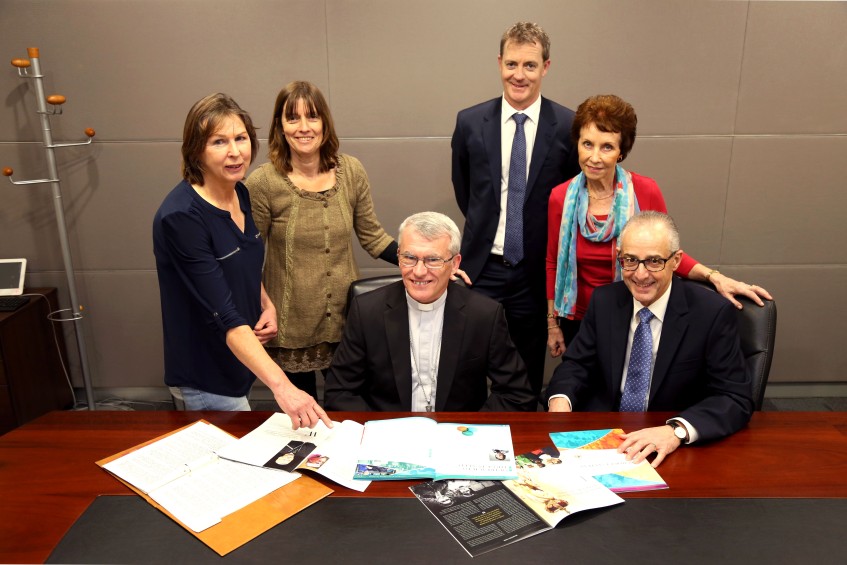EXCLUSIVE New Post Abortion Grief Counselling service opens for the Archdiocese of Perth

Perth Archbishop Timothy Costelloe (centre) and Archdiocesan Research and Project Development Manager Mr Tony Giglia (seated far right) meet with representatives from the four organisations providing the new post-abortion grief counselling service, including, from left, Julie Cook from Abortion Grief Australia, Lisette Jas from Pregnancy Assistance, Rod West from Centrecare Inc and Celia Joyce from the Fullness of Life Centre. Photo: Jamie O’Brien.
By Josh Low and Jamie O’Brien
A new Post-Abortion Grief Counselling service has commenced in the Archdiocese of Perth, with the initiative coming directly from Archbishop Timothy Costelloe SDB.
The idea for the service was initiated by Archbishop Costelloe after a gap in the services being provided by the Archdiocese in the area, together with a growing need for the service, was identified.
Archdiocesan Research and Project Development Manager Mr Tony Giglia, said the aim of the new service will be to provide support and healing without judgement to those who have experienced an abortion, including men.
Mr Giglia went on to explain that the new service will be provided by the Fullness of Life Centre, Pregnancy Assistance, Centrecare Inc and Abortion Grief Australia, who have all signed a memorandum of understanding with the Archdiocese.
“The services provided will be free of charge and those seeking the counselling service can be assured they are getting confidential quality support,” said Mr Giglia.
“It is about following in the footsteps of the Good Shepherd, so that we can further provide a Christ-centred Church that understands the experiences of the people and where they are at in their life today,” he said.
Centrecare Inc Director Tony Pietropicolo AM said the organisation is more than happy to assist and support people who are experiencing post-abortion grief.
“There is a sense of loss a person experiences following an abortion, often unexpectedly, and this may often also be experienced by the people around them.
Hence it is constructive, from a number of perspectives ie emotional, social and spiritually for a person (who is experiencing post-abortion grief) to share their feelings and ideas around what has happened,” Mr Pietropiccolo said.
“The counsellor’s role is to support them as they process this experience,” he said.
Pregnancy Assistance Chairman Eric Jas emphasised that it is a major part of our mission as human beings to follow the example of Jesus in reaching out to those who are hurt and struggling.
“Every time a mother loses her baby, whether intentional or not, she experiences hurt, loss and pain and we are here to help them work through it. That has always been the focus of Pregnancy Assistance,” Mr Jas said.
“What we want to do is not be political about the issue, but put the person first and hopefully do more in terms of conveying the message effectively through the media that we are here to give help and support.
“We are there simply to talk and listen to people who are struggling or suffering,” he said.
Fullness of Life Centre Co-Director Celia Joyce MPS, said that even though people who have experienced an abortion often don’t like to talk about it, opening up about their emotions and experience is so important for healing to take place.
“The effect of abortion touches each person differently but everyone is affected. For example, it could impact a person’s sense of self-worth and the ways in which they live their lives.
“For women and men who have lost a child, they often experience a conflicting range of emotions,” she said.
“These emotions that can trouble them if they do not have an opportunity to talk through their experiences. Such feelings can even surface decades after their loss, if they did not address their experience earlier.”
Research from Abortion Grief Australia shows that despite the prevalence of abortion in the community it is still largely unspoken about, if not hidden, especially when it comes to talking about ongoing grief or distress.
This inhibits those seeking support or counselling, with some not even making any link between abortion and problems in daily functioning.
Abortion Grief Australia’s National Director, Julie Cook, believes one of the big problems is the media and the lack of reporting on the issue of both abortion and the trauma associated with it.
“They will never talk about the trauma it does to men, women and families. It’s basically a no go area, because it ‘wouldn’t be politically correct’ - its taboo. The fact is that they don’t know how to talk about or deal with it,” she said.
“Most health professionals don’t have the training to deal with the issue of post abortion trauma, and the women who are suffering are often so ashamed that they won’t talk to anyone about the grief they are experiencing.”
She emphasised the importance of reaching out to those who have experienced an abortion and are suffering.
“At Abortion Grief Australia we’ve set up these public initiatives so people who are suffering after an abortion know that there’s a helpline; that there is someone they can turn to.
“The public initiatives also help to raise awareness among people in general and the very fact that so many people are getting involved to reach out to those suffering with abortion trauma is a great witness and testament of hope,” she said.
For more information on how to access the new post abortion grief counselling services, go to Click Here
